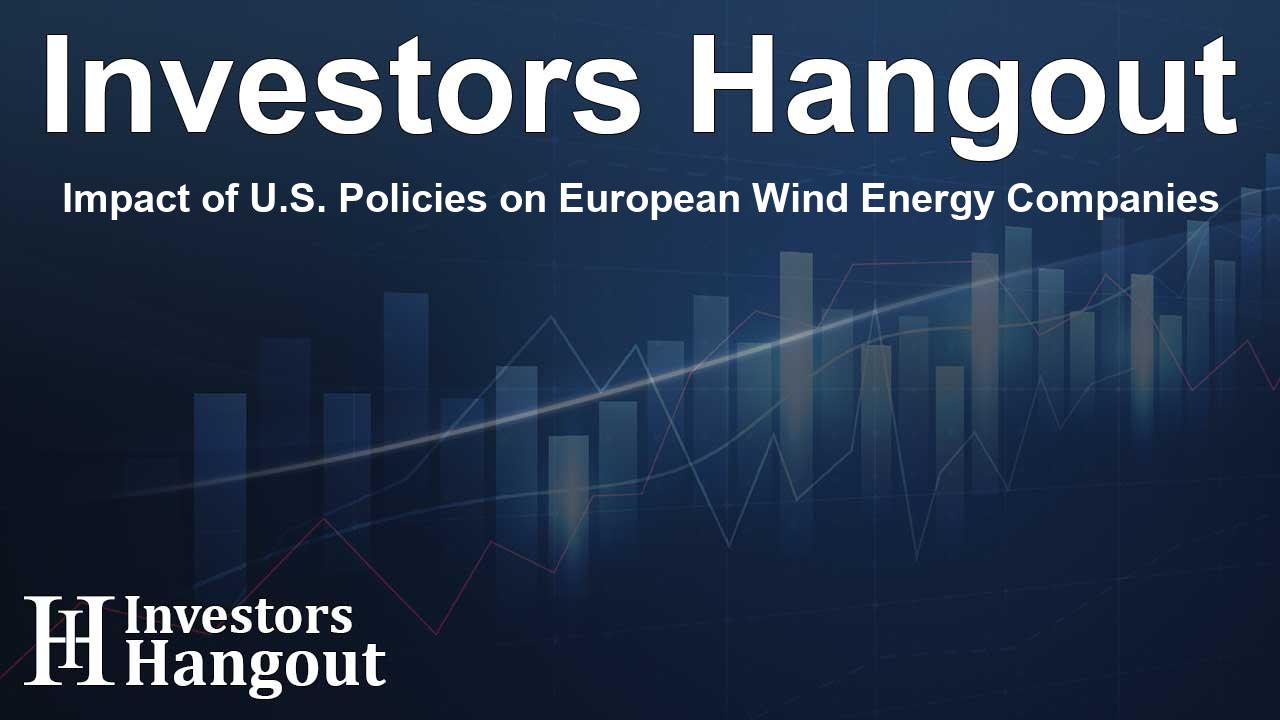Impact of U.S. Policies on European Wind Energy Companies

Impact of U.S. Policies on European Wind Energy Companies
In recent developments, European wind energy companies have experienced a significant downturn following the actions of the U.S. government. On his first day in office, U.S. President Donald Trump's decision to eliminate support for new offshore wind power has sent ripples through the market. This decision heavily impacted key players in the European wind sector, particularly Orsted, which saw a dramatic decline in its stock value.
Orsted Faces Financial Challenges
Orsted, recognized as a leader in the renewable energy sector, suffered a staggering loss of up to 17% after announcing impairment charges amounting to 12.1 billion Danish crowns (approximately $1.69 billion). This financial setback stems largely from issues related to its U.S. offshore ventures.
The Impact of Sunrise Wind Project
Analysts have pointed to the delays and increased costs associated with Orsted's Sunrise Wind project as the primary reason for this significant drop. The anticipated Sunrise Wind project is expected to become one of the largest offshore wind farms in the U.S. However, developments have not progressed as anticipated, resulting in a growing financial burden for the company.
Leases Worthless Under New Policies
In addition to project difficulties, Orsted has identified impairments connected to seabed leases, which industry experts have linked directly to Trump's policy changes. These assets are now viewed as worthless, as any plans to construct new facilities hinge on the current political climate. Sydbank analyst Jacob Pedersen remarked that if projects are stalled due to new regulations, Orsted may be unable to utilize or sell these leases in the future.
Market Reactions and Other Companies Affected
The ripple effects of these policies extend beyond Orsted. Italian firm Prysmian, the world's leading cable manufacturer, has abandoned plans to build a factory in the U.S. for the production of cables needed in offshore wind parks. The company cited a lack of confidence in the U.S. offshore wind market's viability.
Prysmian's Investment Reconsidered
Originally, Prysmian's investment plan in Somerset, Massachusetts, was projected at 200 million euros (around $207 million), aimed at capitalizing on the U.S. wind market. However, as the company reassessed the situation, it found that its existing business focused exclusively on Europe, with no prospects in the U.S. market for offshore wind development.
Impacts on Stock Performance
The stock market reflected these concerns, with Prysmian shares, which had just hit an all-time high, declining by 1.5%. Orsted, which has seen its shares plummet by approximately 84% since their peak in 2021, faced a further 13.6% decrease.
Risks Facing the Industry
Leading analysts are raising alarms about the long-term prospects of the U.S. offshore wind industry under Trump's current policies. They indicate that the risk of halting further offshore wind developments in the coming years presents a significant threat to European companies looking for growth in the U.S. market.
European Companies Feeling the Impact
Firms like EDP Renováveis from Portugal and Germany's RWE have also felt the strain, with their stocks declining by 2% and 1%, respectively. The uncertainty surrounding offshore wind projects has forced these companies to reconsider their strategies and explore alternative markets for future endeavors.
Wind Turbine Manufacturers React
Wind turbine manufacturers such as Nordex and Vestas are not immune, also experiencing drops of around 2% in their shares. This demonstrates the widespread impact of U.S. policy changes on the renewable energy sector across Europe.
Frequently Asked Questions
What decisions made by President Trump impacted European wind companies?
President Trump's elimination of support for offshore wind development on his first day in office has significantly impacted the investments and stock performance of European wind energy companies.
How did Orsted's financial reports reveal their challenges?
Orsted reported substantial impairment charges related to its U.S. ventures—particularly the Sunrise Wind project—which contributed to a sharp loss in its stock value.
What is the status of Prysmian's planned U.S. factory?
Prysmian has decided to halt its plans to build a cable manufacturing facility in the U.S. due to concerns about the viability of the offshore wind market there.
How are other European energy firms reacting to the situation?
Various firms, including EDP Renováveis and RWE, are reassessing their positions in the U.S. market, dealing with stock declines as well.
What future can we expect for offshore wind projects in the U.S.?
The outlook remains uncertain, with significant risks posed by current U.S. policies that may hinder further offshore wind developments.
About The Author
Contact Addison Perry privately here. Or send an email with ATTN: Addison Perry as the subject to contact@investorshangout.com.
About Investors Hangout
Investors Hangout is a leading online stock forum for financial discussion and learning, offering a wide range of free tools and resources. It draws in traders of all levels, who exchange market knowledge, investigate trading tactics, and keep an eye on industry developments in real time. Featuring financial articles, stock message boards, quotes, charts, company profiles, and live news updates. Through cooperative learning and a wealth of informational resources, it helps users from novices creating their first portfolios to experts honing their techniques. Join Investors Hangout today: https://investorshangout.com/
The content of this article is based on factual, publicly available information and does not represent legal, financial, or investment advice. Investors Hangout does not offer financial advice, and the author is not a licensed financial advisor. Consult a qualified advisor before making any financial or investment decisions based on this article. This article should not be considered advice to purchase, sell, or hold any securities or other investments. If any of the material provided here is inaccurate, please contact us for corrections.
